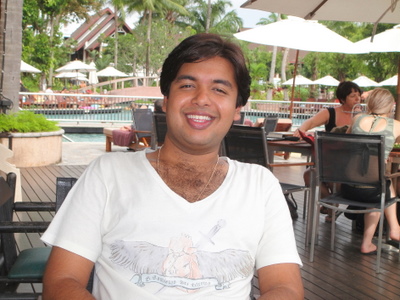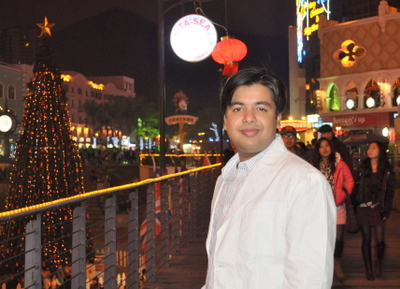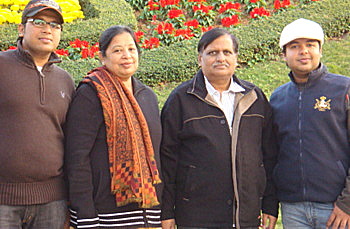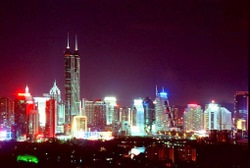
NEXTINSIGHT BRINGS YOU a series of interviews each Saturday with expatriates who call the southern Chinese metropolis of Shenzhen both their workplace and home.
Our aim is to offer insights into what could be The Next Big Thing – Shenzhen – a city whose GDP growth and population have outpaced those of its richer neighbor, Hong Kong, for as long as this writer can remember.
We also hope to bring a series of revealing snapshots on just what it takes for non-locals to live and work here, and thrive while doing so.
A common thread linking these industrious expats together is how they have taken the best from their diverse cultural backgrounds to make a name for themselves in a faraway place like Shenzhen.
The Middle Kingdom takes great pride in being a country with 56 officially recognized ethnicities. But among China’s 1.3 bln denizens, the majority Han Chinese still make up well over 90% of the total population.
Despite the fact that the country is no longer building Great Walls to keep foreigners out, expats – especially non-Han residents -- are still a relative rarity in Chinese cities compared to say New York, London or Melbourne.
But the days of putting up walls are a thing of the distant past and cities like Shenzhen, which borders the more cosmopolitan Hong Kong, are beginning to catch up in terms of their expat tallies.
In this third installment, we meet Indian expat Mr. Ankur Gupta, a director with technology firm Mega Regent International Ltd.

Reverse osmosis
Mr. Gupta says one of the first things to strike him about life in Shenzhen was the population density. This might sound surprising coming from an Indian national as the subcontinent’s over one bln denizens give the democracy a slightly higher population density than the People’s Republic.
However, he is right in the sense that Shenzhen has quickly surpassed Beijing and Shanghai to become the most crowded city in China.
Mr. Gupta has been managing Mega Regent International Ltd’s R&D and export operations for IT products and electronics in Shenzhen for the past two years.
Prior to his current stint in Shenzhen, he held positions with both Dell Inc and Bank of America.
He recently met with NextInsight to let us know just how a professional from a fellow BRIC country -- and one of only two nations with populations north of one bln -- got on in Shenzhen.
NextInsight: How would you describe the business operating climate where you are now compared to that in your homeland?
Mr. Gupta: Coming from a similar developing country, I feel the pace of business has increased manyfold in China. Primarily being a manufacturing country which is export oriented, local businesses depend heavily on fulfilling and satisfying the needs of its distant clients. As production is in huge volumes, Chinese firms benefit from economies of large scale, and thereby attract buyers from around the world.
What are the most obvious changes you have witnessed or sensed during your time here?
Mr. Gupta: My stay here for 2 years now has definitely made me sit up and notice the rate at which Shenzhen as a city has been growing. The population here has grown quickly and Shenzhen is now the most populated city in terms of per square kilometer density in China.
Standards of business have changed rapidly where in management are willing to go to any extent to attract buyers. With English being taught at the middle levels in school, the current and future generation of students would be better equipped to face the world. Standards of English are improving, though still far from the desired levels. Due to this, 'Chinese Whispers' play their part in disturbing smooth working operations even now.
If your children (current or future) told you they wanted to settle in your current city (in China), study, work and raise a family here, how would you feel?
Mr. Gupta: Having stayed and travelled around many cities of the world and having always had the say to make my own decisions, I would allow them to take their own path. Though I would surely advise and guide at the right moments, At the end of the day, I would prefer them to study and get their education outside of China.
My home country or any other good place for education would be fine. In spite of how fast the Chinese are developing their educational system, I still feel they would be better served in terms of all-round development in other places such as India, Singapore or Canada. And from then on they have the right to decide where they want to work or raise a family.
If the economy in the current city where you are slows of softens considerably, would you immediately relocate, or do you feel China is your home and you will ride out the rough times?
Mr. Gupta: We all have experienced crises of different forms in our lives, whether it’s the economic crisis resulting from a recessionary period or the crisis resulting from poorly made choices. But then I believe ‘One man’s crisis is another man’s opportunity’.
We all have to take risks in everyday life and so this too wouldn’t be too difficult a decision to make. I would stick to my work here as I am confident about my abilities and strengths to overcome the tough times. Also, China has enough to offer a skilled workforce. Patience and self-confidence will sail us through. Currently, China and India are ranked No.1 and No.2, respectively, in terms economic development for non G8 countries.

What are some of the best things about doing business in China today? What things would you most like to see changed?
Mr. Gupta: All my life I have been involved in technology and its applications. Having done my software education and managing an IT business back in India, the best part of doing business personally for me is to deal with technology firsthand.
Generally speaking, Chinese are excellently skilled and motivated workers. They just need someone to lead them in the right direction sometimes. Ironically, copying of goods is not right, but then only a very skilled person can duplicate the original to perfection.
Of the things I would like to see most is more awareness and practice of business ethics, As of now, there is no trust and belief that exist in the business fraternity here. This has been a direct result of cut-throat competition which has led companies to commit to over and above their capacity permits.
This basically leads to non-fulfillment of commitments, inferior quality, delayed production and thereby impacts the whole process and working methods here. Another important change which the world would be vouching for is to implement an awareness of the need to protect intellectual property rights (IPR) and patents. If taken in the right direction, this could take China into a whole new world of rapid advancement.
How do you feel about the current residential property prices in Shenzhen for renting? How about for buying? How have you noticed property prices going up/down in your time here?
Mr. Gupta: When I first came to Shenzhen, property prices seemed high to me. But in due course, with the global recession, the prices came crashing down and properties were being traded for 50% of their original value. Many people cashed in on that boom and procured acres of properties. But with several socioeconomic reforms taken by the central and Shenzhen governments, property prices have boomeranged 200% in the last six months or so.
Owning a house is an out-of-reach dream for many now. I believe this is a temporary real estate boom which may go bust if proper measures are not taken in a timely manner. Renting a place in Shenzhen is not very affordable for many as the costs of living have soared.
How about the cost of transportation, entertainment, and food/drink?
Mr. Gupta: The cost of living in Shenzhen was very reasonable a few years back where everyone could seemingly enjoy their share of life’s buffet But over a period of time, the prices for all essential commodities have soared.
Travelling has become a time consuming and expensive affair. Entertainment costs are bound to increase as the unrealistic figures the industry had marked up initially are now taking their toll. With high maintenance costs and increased costs of basic necessities, luxuries are even more dear now.

Has your income risen at the same rate as inflation (rise of property/transportation, entertainment, food/drink?
Mr. Gupta: With the rise in inflation, personal income is also bound to go up. At this point, things seem to be in control, but if corrective measures are not taken periodically, then things could get lot tougher.
Is your business doing better, worse, or the same as when you first began working in Shenzhen? Why do you think that is? What are your plans to improve your business in Shenzhen over the next year?
Mr. Gupta: Having adapted to the local ways of working, things have been on the rise. With rapid technological advancements, the industry is now able to offer superior quality at affordable prices. Business has become better because of the diversification strategy which is possible because of the multi-faceted product offerings by the factories here.
A major part of businesses becoming better here is the need to understand how things work internally. For this year and next, we intend to diversify further and take advantage of being located in the knowledge and manufacturing capital of the world.
How does the cost of living in Shenzhen compare to the cost of living in your homeland? Does the cost of rent, transportation, entertainment, and food/drink make up a larger or smaller percentage of your income in Shenzhen than it would in your homeland?
Mr. Gupta: The cost of living is higher here compared to India. The basic necessities of life constitute a majorly of monthly expenses. I would say, in my home town, I wouldn’t be spending more than 50% of my income on these basic things but here it’s almost as high as 60-70%. All in all, I consider China my home away from home!
Click here to see last week's story about an Egyptian man who believes China is following the right path to its own unique development.







